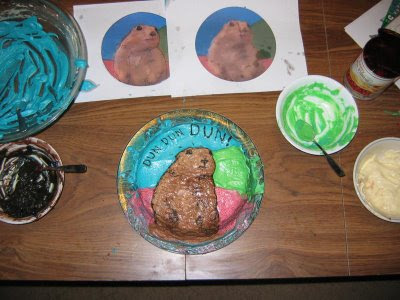skip to main |
skip to sidebar
 One of the most famous spin-offs of from the LOLcat meme is the LOLrus. The original LOLrus image showed a walrus who had his bucket forcibly taken from him. The ide of the LOLrus and his missing bucket has been adopted by the internet, and many have added new chapters to the ‘missing bucket’ saga. Someone has now compiled the pictures into a full story… see it here.
One of the most famous spin-offs of from the LOLcat meme is the LOLrus. The original LOLrus image showed a walrus who had his bucket forcibly taken from him. The ide of the LOLrus and his missing bucket has been adopted by the internet, and many have added new chapters to the ‘missing bucket’ saga. Someone has now compiled the pictures into a full story… see it here.
 What are they?
What are they?
LOLcats are images that combining a cute cat photograph captioned with a humorous phrase in broken English. They are a form of ‘image macros’ and originated on Internet message boards.
LOLcats are a form of 'meme' - an internet phenomenon that spreads rapidly like a fad.
How they began:
Not so long ago, message boards contained text-only conversations. As they developed to include images, message board users started adopting their own ‘language’. For example, message board users would post a picture of a snowy owl with the caption ‘O RLY?’ (Oh really?) to indicate that a previous person’s comment was really obvious. As this language developed, cutesy cat pictures became the flavour of the month. The first LOLcats appeared on the 4chan imageboards as the Caturday internet phenomenon. The name 'LOLcats' " is a compound word of "lol" (an abreviation of Laugh Out Loud, a term frequently used in chat rooms) and "cat".
 I can has cheezburger?
I can has cheezburger?
www.icanhascheezburger.com was the first site to gather, organise and tag the lolcats. The site now features a lolcat builder, so you can create your own.
Their own language:
The wording on LOLcat images is written in a form of baby-talk, which has been called Kitty Pidgin, Kitteh, or lolspeak. The wording is meant to be the direct speech of the pictured cat.
Sub-groups within the meme:
As the in-joke grows, contributors veer off on a tangent, creating their own form of in-joke - they may, for example, employ different grammatical patterns or use different contexts. For example, within the LOLcats meme, you get an 'invisible' sub-group featuring pictures of cats eating invisible sandwiches or dancing with invisible tango partners.

Another sub-group involves another Internet in-joke that was started by computer gamers. The "I'm in ur X, doing Y" construction originates from an old video game taunt: "I am in your base, killing your d00ds."
Extending the in-joke
Why stop at kittens? Other captioned creatures have made an appearance – notably the walrus whose bucket was stolen. But don’t think it ends there - a new LOL-spinoff is created every week. The Lolpresident series pokes fun at Bush, using humorous pictures with the same baby-like talk.


Fame!
LOLcats gained international attention when they were covered by Time magazine, which wrote that non-commercialised phenomena of the sort are increasingly rare, stating that lolcats have "a distinctly old-school, early 1990s, Usenet feel to [them]."
 Previously I blogged about a Rickroll cake that was hidden beneath a 'cake that was a lie'...
Previously I blogged about a Rickroll cake that was hidden beneath a 'cake that was a lie'...























